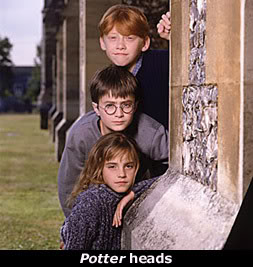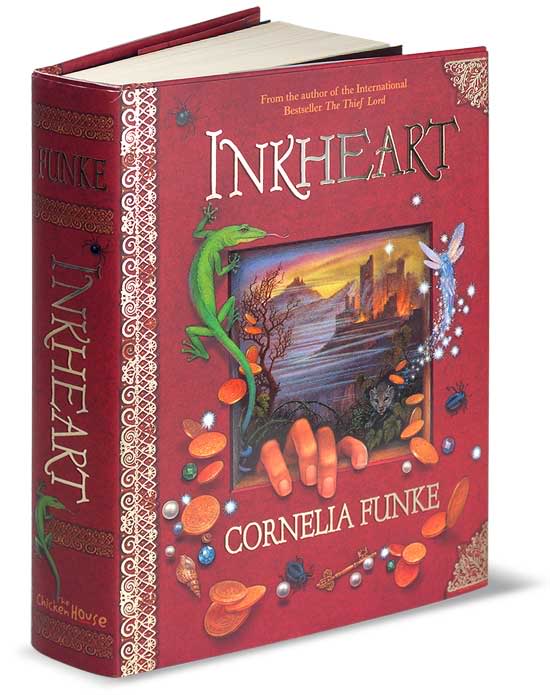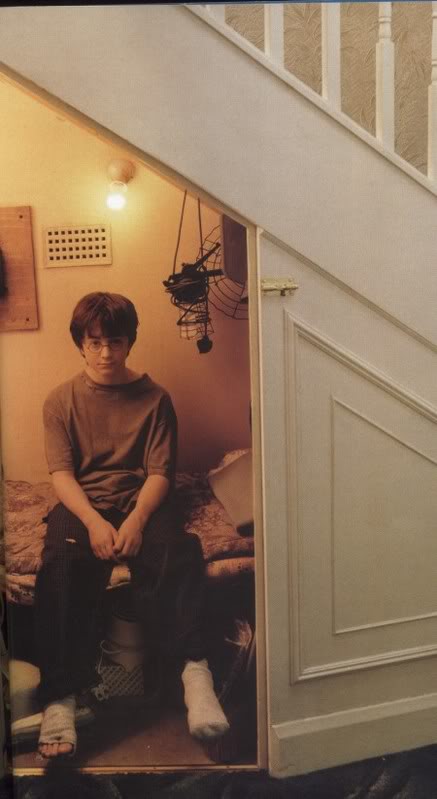INTERVIEW: Barry Cunningham, Part 2
By Therese Walsh | December 15, 2006 |
 If you missed part one of our interview with Barry Cunningham, do yourself a favor a click HERE to read it now. Barry is not only the publisher and Managing Director of the UK’s Scholastic imprint, The Chicken House, he is also the man who famously discovered JK Rowling and Harry Potter. He spoke with Writer Unboxed recently about that discovery (in part 1, HERE) and his take on the dynamic children’s book industry–new trends, the next Harry Potter, the Hollywood factor and more. We are truly honored to have him with us.
If you missed part one of our interview with Barry Cunningham, do yourself a favor a click HERE to read it now. Barry is not only the publisher and Managing Director of the UK’s Scholastic imprint, The Chicken House, he is also the man who famously discovered JK Rowling and Harry Potter. He spoke with Writer Unboxed recently about that discovery (in part 1, HERE) and his take on the dynamic children’s book industry–new trends, the next Harry Potter, the Hollywood factor and more. We are truly honored to have him with us.
Part 2: Interview with Barry Cunningham
Q: High concept stories generally translate well to film. Is the Hollywood factor something you consider when you sign a new author and commit to a new story?
BC: I do work a lot with Hollywood and books. In fact, we have our own entertainment company that works with this. Good children’s writing is by nature very visual—that is the power of children’s writing. You’ve got to be very clear, very visual, and you’ve got to have a good pace to your story to keep children reading. This can translate well to movies, because Hollywood likes to see the same kind of stuff, and Hollywood is truly engaged with the power some of these books have on readers. So while I don’t look specifically for the Hollywood angle, I think it can come with the territory of good children’s writing.
Q: Do you think Hollywood offers any lessons for the writer?
BC: I think what Hollywood brings us in terms of a lesson is a better grip of or consideration for plotting. I think often in books, authors could move it along a bit more. In movies, you can see in moments what it may take an author a page or more to describe, so we have a different attitude to plot and story. That’s different in different countries, as well. In America, you’re seeing better dialogue, and often authors are better at dialogue because you’ve grown up with very good movies and very good TV, and so you have a better grip of characters explaining their actions through dialogue. A lot of European writers have a better handle on description than their American counterparts. So I think we each have something to learn from the other.
Q: How important is plot as opposed to voice in the children’s market?
BC: Well, it’s controversial, but I think voice is more important, because a lot of children are carried through a book by voice and characters. What happens is important, of course, but really—take a look at JK Rowling and Cornelia Funke. Plot is not as important as what you say and the way it’s said. You as an author can bring about a lot of fascination for your central  characters and the voice you alone bring to your story. But I believe the most important quality you can bring to a book is that a story needs to have hope, and characters who are children themselves who work to grow that hope. That’s a crucial thing. Books that depend on a plot that is a string of dreadful events without voice or compelling characters or hope will never work. And it certainly won’t work if the adults are coming to the rescue; it will only work when the children characters work through the problems themselves. Relying on plot to get out of difficulties almost always fails. Depend on the children in the story instead.
characters and the voice you alone bring to your story. But I believe the most important quality you can bring to a book is that a story needs to have hope, and characters who are children themselves who work to grow that hope. That’s a crucial thing. Books that depend on a plot that is a string of dreadful events without voice or compelling characters or hope will never work. And it certainly won’t work if the adults are coming to the rescue; it will only work when the children characters work through the problems themselves. Relying on plot to get out of difficulties almost always fails. Depend on the children in the story instead.
Q: What are some of your top tips for crafting compelling stories?
BC: Well, my most frequent advice for new authors is to start your story with chapter two. Often, the very first chapter of the stories I read are really busy explaining stuff to me. It’s much better to start with something happening and explain the rest later. So start later in your story, try to come in at a different point, leave the history for later, because I don’t want to know any of that until after the story has really got some momentum. The great story films, like those by Hitchcock, start with the gun going off and explain why and all of that later. It’s an important point, especially with children, because they’ve got to care in order to keep reading. Start at the point when you can engage the child. The bear is chasing you already, that will grip you to begin with. Go back to the reasons later.
Q: How willing are publishers to work with novelists deemed to have promise but who may need some guidance? Is the story sometimes worth going through this extra effort?
BC: Chicken House specializes in new people. We are more willing than most to work with new authors, especially if we see potential. If we believe a kernel of greatness is in a book, we will work a great deal with a first-time novelist. I think most good publishing houses are still like that. It’s very difficult to get material read by a good decision maker. Chicken House is good like that, but we’re unique in that we consider unsolicited relationships, and major starts have come into house nonagented.
Q: Do you have any tips for authors who want a chance to shine in the slush pile?
BC: It’s enormously difficult as a new author to get anyone to read your material. Any kind of hook as to the reason why anyone should read your story is going to help. Write whether you have personal experience with a topic in your book or have read other books by that publisher. The truth is that everyone likes being flattered, and I really will be more likely to read your story if I know you’ve read other books I’ve published.
Q: Have you ever had to fight for a story you believed in, or have your coworkers generally fallen in love with the same pieces you have?
BC: Yes, even though I’m “boss,” we maintain discipline in that we go through a fair process. There has to be true reason to take on a book. There’ve been some books I’ve had to fight for, and there are some authors who you have to stick with even after a not-so-successful first book. It can be very difficult with a new author, but it can be worth it, because sometimes the 2nd book is the one you’ve been waiting for.
Q: Have you noticed any publishing trends that writers may not be aware of? And what new books are you most excited about?
BC: I think there is a growing awareness that in the pursuit of older novels, books in the 10+ age range, there has been a neglect of novels in the 7-9 year-old range. This has been the traditional heartland of children’s books, but it’s been overtaken by formula series. There has recently been some return to that age range, which is hopeful. And there is still a lot of activity in teenage books, and books as they get older really.
Q: Tell me about Cornelia’s work and how it has affected you. I just adore her Inkworld series.
 BC: It’s really amazing, isn’t it? An author loses control of his own books; it’s the ultimate fairy tale and the ultimate piece of imagination. We’ve all dreamt of jumping into our favorite books. The trick is seeing how things will change once that happens, once the “real” person is playing the part of a “fictional” hero. It’s just a wonderful piece of imagination, and I’m happy to say we should be able to see it on the big screen in 2007.
BC: It’s really amazing, isn’t it? An author loses control of his own books; it’s the ultimate fairy tale and the ultimate piece of imagination. We’ve all dreamt of jumping into our favorite books. The trick is seeing how things will change once that happens, once the “real” person is playing the part of a “fictional” hero. It’s just a wonderful piece of imagination, and I’m happy to say we should be able to see it on the big screen in 2007.
Q: What does Chicken House do to help promote its authors? What should authors be prepared to do for themselves?
BC: Yes, we work very hard with our authors. We do author tours and we do quite a lot of appearance and publicity. We publish only about 25 books a year and about 6 are brand new authors. As I mentioned, we work very closely with our new authors and have the style of an old-fashioned editorial process. We absolutely hand edit things and work extremely closely with our authors, trying to get the very best story and writing we can. We also promote professionally and have partnerships all over the world. We’re very fortunate that we’ve had a relationship with Scholastic in the United States. We also publish in Australia and New Zealand; we publish works simultaneously around the world, so we get a platform for authors where no one would have heard of them otherwise. We’re very fortunate in that our partners trust us in what we’re doing and that we have a solid reputation in the UK and US.
Q: What would you love to find in the slush pile?
BC: Well, that’s a good question. I suppose what I’d love to find in the slush pile is a novel for 7-9 year olds that was as wonderful as Roald Dahl’s Magic Finger or one of those brilliant younger children’s classics that you knew would last across generations. Nothing about any huge great crossover fantasy, but a great story for that age group. So my ambitions are quite modest, and I know to keep hoping, because you never know what’s coming in the next brown package.
Q: How would an author go about submitting work to Chicken House?
BC: We do take unsolicited submission. You can send a synopsis and 3-4 sample chapters of your chapter book or younger novel; younger novels is how I describe them—they’re anything from 25,000 to 35,000 words.
 Q: Are you keeping your eye out for the next new thing? The next Harry Potter?
Q: Are you keeping your eye out for the next new thing? The next Harry Potter?
BC: One thing you can rely on is that the next HARRY POTTER will be nothing like HARRY POTTER. It will be something completely different. Look at Cornelia Funke, for example. She writes in a completely different way and from a completely different tradition. People who write to pursue a phenomenon should know it will never work.
Q: I just have to ask: Do you think someone would’ve discovered Harry and JK if you hadn’t?
BC: Well, it’s difficult to say because so many had turned it down, but I think if I hadn’t… Jo said this in one of her interviews somewhere, “If Barry hadn’t made that decision to take me on, Harry might still be under the stairs.” I like to think I made a difference.
Thank you, Barry Cunningham, for a fascinating interview, and best of luck finding the next hot commodity in children’s writing!










first the interview questions were probing and elicited quite a bit of info from the interviewee. good job. secondly, i appreciate knowing what an editor/publisher wants in a book and i gleaned quite a bit from this one. May we all be discovered by someone as kind and wise as Mr. Cunningham. third, i think Writer Unboxed has delivered some fantastic interviews. May i suggest you edit them into a book on writing???
“Well, it’s controversial, but I think voice is more important, because a lot of children are carried through a book by voice and characters.”
As a middle grade writer, I know that even if my plot is great, it still has to have an IT factor.
Great comment.
Thanks! This has been really useful – especially Part Two.